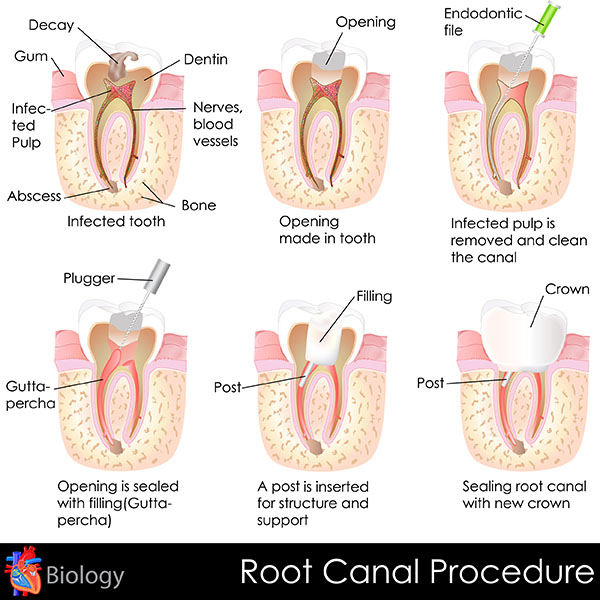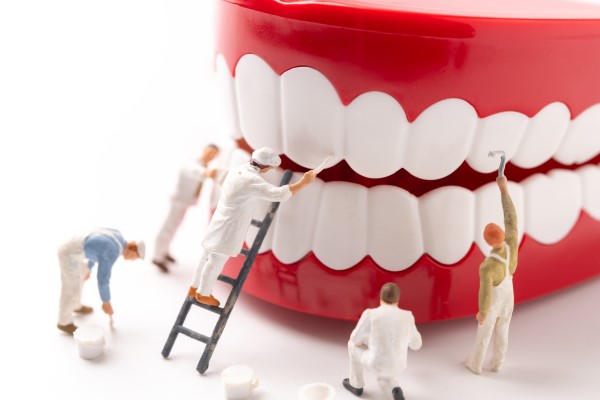What is Endodontics and How can an Endodontist Save your Teeth?
 Endodontics is a dental specialty that deals with the study, diagnosis, and treatment of the dental pulp and the tissues surrounding the root of the tooth. Endo is a Greek word meaning inside, while "odont" is a Greek word meaning tooth. Endodontics treatment involves treatment of the soft pulp tissues inside the tooth.
Endodontics is a dental specialty that deals with the study, diagnosis, and treatment of the dental pulp and the tissues surrounding the root of the tooth. Endo is a Greek word meaning inside, while "odont" is a Greek word meaning tooth. Endodontics treatment involves treatment of the soft pulp tissues inside the tooth.
An endodontist is a professional who specializes in treating the soft pulp tissues inside the patient's teeth. In clinical terms, endodontists help preserve part or all of the dental pulp if the tooth is healthy or remove the pulp if it is infected. This includes situations where the patient has irreversible infected and inflamed pulpal tissue.
What is the purpose of endodontic treatment?
The primary purpose of endodontic treatment includes:
- Disinfecting an infected and inflamed root canal
- Removing pathological pulp
- Cleaning the root canal system
- Reshaping the root canal system
- Filling the root canal system to prevent re-infection and promote healing
What dental issues require endodontic treatment?
There are very many reasons why a patient may require a root canal. A patient who has suffered dental trauma is a prime candidate for endodontic treatment. When patients ignore tooth decay to the point where it reaches the inner chambers of their teeth, an endodontist can help disinfect the area and save the tooth. Endodontists also help with abscesses, old fillings, chipped and fractured teeth, and infected dental pulp.
What procedures do endodontists handle?
Endodontists handle all root canal treatment and surgeries. They also place dental implants and address any traumatic dental injuries. The role of the endodontist is to save the patient's natural tooth whenever possible. However, they always explore all treatment options to ensure comfort and optimal dental health for their patients.
When should a patient visit an endodontist?
Most people dread a visit to the dentist's office, and they may stay at home with dental issues until the pain is too hard to bear. However, this is not advisable. By visiting an endodontist as soon as you notice a problem, you can help preserve your tooth and provide relief from toothaches.
Patients who have injured their teeth in accidents or traumatic sports must visit the endodontist immediately. The fractured and chipped teeth are exposed to plaque and bacteria, which can promote tooth decay and result in more and more pain.
If a patient notices that their teeth are sensitive to cold, hot or acidic foods and drinks, they should visit an endodontist. The chances are that their enamel has worn off, exposing the nerve endings of the teeth. This occurrence can result in teeth sensitivity and pain.
Patients should also visit an endodontist if they notice any swelling around their gums, teeth or face. The swelling could be a sign of an infection. The specialist can clean and disinfect the area and provide treatment that prevents re-infection.
Toothaches can be a serious problem, talk to a dentist today!
When a patient experiences toothaches, their dentist may refer them to an endodontist. This specialist provides endodontic treatment to help keep the tooth healthy and free from infections. If you have a toothache, talk to a dentist or endodontist to find out what they can do to save your tooth and provide relief from the pain.
Request a dental appointment here: https://brimhalldentalgroup.com or call Brimhall Dental Group at (661) 249-1122 for an appointment in our Bakersfield dental office.
Recent Posts
The routine oral care that you receive on an ongoing basis involves general dentistry. You should see a general dentist first if you have any symptoms of dental disorders, as early intervention is often the key to preventing costly damage and extreme discomfort. Additionally, you should also visit periodically even when you do not have…
Seeing a general dentist for regular checkups should be part of your dental care routine. This dental professional can help maintain and even improve your teeth and gum health. Asking the right questions can help you know more about proper oral care. Below are some of the questions you can ask your general dentist during…
A general dentist will tell you all of the benefits of flossing on a regular basis. Flossing should be a very important part of your daily oral hygiene routine. Brushing your teeth is the first round of defense in fighting tooth decay but do not underestimate the value of flossing. When you get into the habit…
General dentistry commonly handles toothaches among other dental concerns. While this is a routine issue that is easily treatable, it is common for patients to have several questions about it and what they should do if they experience it. Here we will answer some commonly asked general dentistry questions and advice on the best ways…


